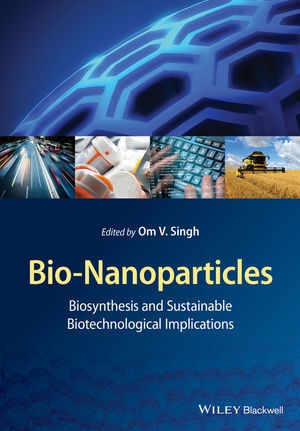Read more
Informationen zum Autor Om V. Singh , PhD, is an Associate Professor of Microbiology at the University of Pittsburgh, Bradford in Bradford, PA, USA. Klappentext Nanoparticles are the building blocks for nanotechnology; they are better built, long lasting, cleaner, safer, and smarter products for use across industries, including communications, medicine, transportation, agriculture and other industries. Controlled size, shape, composition, crystallinity, and structure-dependent properties govern the unique properties of nanotechnology.Bio-Nanoparticles: Biosynthesis and Sustainable Biotechnological Implications explores both the basics of and advancements in nanoparticle biosynthesis. The text introduces the reader to a variety of microorganisms able to synthesize nanoparticles, provides an overview of the methodologies applied to biosynthesize nanoparticles for medical and commercial use, and gives an overview of regulations governing their use. Authored by leaders in the field, Bio-Nanoparticles: Biosynthesis and Sustainable Biotechnological Implications bridges the gap between biology and technology, and is an invaluable resource for students and researchers alike. Zusammenfassung Nanoparticles are the building blocks for nanotechnology; they are better built, long lasting, cleaner, safer, and smarter products for use across industries, including communications, medicine, transportation, agriculture and other industries. Inhaltsverzeichnis List of Contributors xv Introduction xvii 1 Diversity of Microbes in Synthesis of Metal Nanoparticles: Progress and Limitations 1 Mahendra Rai, Irena Maliszewska, Avinash Ingle, Indarchand Gupta, and Alka Yadav 1.1 Introduction 1 1.2 Synthesis of Nanoparticles by Bacteria 2 1.3 Synthesis of Nanoparticles by Fungi 9 1.4 Synthesis of Nanoparticles by Algae 12 1.5 Applications of Metal Nanoparticles 16 1.5.1 Nanoparticles as Catalyst 16 1.5.2 Nanoparticles as Bio?]membranes 17 1.5.3 Nanoparticles in Cancer Treatment 17 1.5.4 Nanoparticles in Drug Delivery 17 1.5.5 Nanoparticles for Detection and Destruction of Pesticides 17 1.5.6 Nanoparticles in Water Treatment 18 1.6 Limitations of Synthesis of Biogenic Nanoparticles 18 References 20 2 Role of Fungi Toward Synthesis of Nano ?] Oxides 31 Rajesh Ramanathan and Vipul Bansal 2.1 Introduction 31 2.2 Fungus?]mediated Synthesis of Nanomaterials 34 2.2.1 Biosynthesis of Binary Nano?]oxides using Chemical Precursors 34 2.2.2 Biosynthesis of Complex Mixed?]metal Nano?]oxides using Chemical Precursors 39 2.2.3 Biosynthesis of Nano?]oxides using Natural Precursors employing Bioleaching Approach 42 2.2.4 Biosynthesis of nano?]oxides employing bio?]milling approach 44 2.3 Outlook 46 References 47 3 Microbial Molecular Mechanisms in Biosynthesis of Nanoparticles 53 Atmakuru Ramesh, Marimuthu Thiripura Sundari, and Perumal Elumalai Thirugnanam 3.1 Introduction 53 3.2 Chemical Synthesis of Metal Nanoparticles 54 3.2.1 Brust-Schiffrin Synthesis 55 3.3 Green Synthesis 57 3.4 Biosynthesis of Nanoparticles 58 3.5 Mechanisms for Formation or Synthesis of Nanoparticles 61 3.5.1 Biomineralization using Magnetotactic Bacteria (MTB) 61 3.5.2 Reduction of Tellurite using Phototroph Rhodobacter capsulatus 62 3.5.3 Formation of AgNPs using Lactic Acid and Bacteria 62 3.5.4 Microfluidic Cellular Bioreactor for the Generation of Nanoparticles 62 3.5.5 Proteins and Peptides in the Synthesis of Nanoparticles 65 3.5.6 NADH?]dependent Reduction by Enzymes 65 3.5.7 Sulfate and Sulfite Reductase 66 3.5.8 Cyanobacteria 67 3.5.9 Cysteine Desulfhydrase in Rhodopseudomonas palustris 6...

